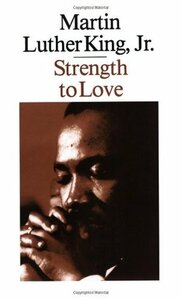Take a photo of a barcode or cover
Really insightful collection of sermons. I particularly loved the piece on Christianity and Communism and Loving Thy Enemy. I really found it comforting to engage with while navigating feelings around the 2020 election.
I was particularly impressed by the sharpness of King's critique and how pertinent they felt in 2020.
I was particularly impressed by the sharpness of King's critique and how pertinent they felt in 2020.
Excellent book! I don't agree with MLK's views on social reform but he does an amazing job of telling the importance of love when faced with conflict. You can feel his love of God and how we as Christians should go about living our life. This book was written during the fall of segregation but so much can be related to what our country is facing today. Truly miss his presence today. I think so much is lost today about who MLK was and what he did and stood for the the 60's. I can honestly say I did not know much about him until I started reading his books. Everyone should read this book!!!
Finally read my first Martin Luther King Jr. sermons and now have a higher standard for all sermons. His passion lives through his words, especially his hope for a desegregated community of equals, nonviolence, and forgiveness. He lived his faith out with a vision that grew from a local bus protest to a worldwide dream.
As a non-Christian man, I’m not that accustomed to Christian theology or beliefs. Not surprisingly, Dr. Martin Luther King makes a deeply sensible and intelligent analysis about Jesus and the apostles, as well as the Church that enabled racism for hundreds of year in the USA. With a peaceful, loving approach to religion and an on-point analysis about the systems of power that allow discrimination, I recommend this book to everyone. Thoroughly inspiring.
I hate to admit it, but it took me this long to finally read a book by MLK himself. It was incredible— rich, thought-provoking, Gospel-centered, timely, relevant, powerful.
This collection of Dr. King’s sermons and meditations touches on themes that are more relevant than ever. Dr. King talks about the importance of having “a tough mind and a tender heart,” of being brave enough not to conform to majority opinion when that opinion is wrong and dangerous, and of loving your enemies (“Far from being the pious injunction of a Utopian dreamer,” he asserts, “the [biblical] command to love one’s enemy is an absolute necessity for our survival.”). He also talks about how to work through fear and shattered dreams. All of these topics are universally relevant and of lasting, timeless importance.
However, what really stand out to me are Dr. King’s strong admonitions to the Christian church regarding its failure to stand up for the marginalized and oppressed. “Nowhere is the tragic tendency to conform more evident that in the church,” he declares, “an institution that has often served to crystallize, conserve, and even bless the patterns of majority opinion. The erstwhile sanction by the church of slavery, racial segregation, war, and economic exploitation is testimony to the fact that the church has hearkened more to the authority of the world than to the authority of God. Called to be the moral guardian of the community, the church at times has preserved that which is immoral and unethical. Called to combat social evils, it has remained silent behind stained-glass windows. Called to lead men on the highway of brotherhood and to summon them to rise above the narrow confines of race and class, it has enunciated and practiced racial exclusiveness.” Sadly, this admonition—as well as his numerous other criticisms of the Christian church—still rings very true today. As a human institution striving to represent the love of Jesus Christ, the Christian church will never be perfect, but that is no excuse for turning a blind eye to—much less sanctioning—injustices done to groups marginalized by race, class, gender identity, sexual orientation, nationality, immigration status, or faith. And yet the church has done so again and again. In these admonitions, I also recognize and confess my own failure as a Christian to advocate for the marginalized. I need to do better. The Christian church needs to do better.
Despite all the shortcomings of the Christian church and of humanity, however, Dr. King still had optimism for the future, because he believed in a God who “is able to conquer the evils of history. His control is never usurped. If at times we despair because of the relatively slow progress being made in ending racial discrimination and if we become disappointed because of the undue cautiousness of the federal government, let us gain new heart in the fact that God is able. In our sometimes difficult and often lonesome walk up freedom’s road, we do not walk alone. God walks with us.” As a black man who received daily death threats because of his determination to continue the work he started for the 1960s Civil Rights Movement, whose daughter asked, “Daddy, why do you have to go to jail so much?” and who often felt tempted to give up in the face of so much opposition, Dr. King most certainly did not write these words without cost or care. It both pains and comforts me that his words of advice, encouragement, and admonition speak so clearly to the divisive political and social climate we’re facing today.
However, what really stand out to me are Dr. King’s strong admonitions to the Christian church regarding its failure to stand up for the marginalized and oppressed. “Nowhere is the tragic tendency to conform more evident that in the church,” he declares, “an institution that has often served to crystallize, conserve, and even bless the patterns of majority opinion. The erstwhile sanction by the church of slavery, racial segregation, war, and economic exploitation is testimony to the fact that the church has hearkened more to the authority of the world than to the authority of God. Called to be the moral guardian of the community, the church at times has preserved that which is immoral and unethical. Called to combat social evils, it has remained silent behind stained-glass windows. Called to lead men on the highway of brotherhood and to summon them to rise above the narrow confines of race and class, it has enunciated and practiced racial exclusiveness.” Sadly, this admonition—as well as his numerous other criticisms of the Christian church—still rings very true today. As a human institution striving to represent the love of Jesus Christ, the Christian church will never be perfect, but that is no excuse for turning a blind eye to—much less sanctioning—injustices done to groups marginalized by race, class, gender identity, sexual orientation, nationality, immigration status, or faith. And yet the church has done so again and again. In these admonitions, I also recognize and confess my own failure as a Christian to advocate for the marginalized. I need to do better. The Christian church needs to do better.
Despite all the shortcomings of the Christian church and of humanity, however, Dr. King still had optimism for the future, because he believed in a God who “is able to conquer the evils of history. His control is never usurped. If at times we despair because of the relatively slow progress being made in ending racial discrimination and if we become disappointed because of the undue cautiousness of the federal government, let us gain new heart in the fact that God is able. In our sometimes difficult and often lonesome walk up freedom’s road, we do not walk alone. God walks with us.” As a black man who received daily death threats because of his determination to continue the work he started for the 1960s Civil Rights Movement, whose daughter asked, “Daddy, why do you have to go to jail so much?” and who often felt tempted to give up in the face of so much opposition, Dr. King most certainly did not write these words without cost or care. It both pains and comforts me that his words of advice, encouragement, and admonition speak so clearly to the divisive political and social climate we’re facing today.
This book is so worth the read!!! It applies so much to so many different aspects of our world today.
challenging
emotional
hopeful
inspiring
reflective
slow-paced
King was clearly well-read and had an incredible vocabulary. This collection of sermons proves he was as great a writer as he was a speaker. However, because so much of this is focused around Christian values and mores, it did become repetitive, and I disagreed with a lot of his takes.
(In particular, his criticisms of humanism, as well as his staunch philosophy of nonviolence. I understood his point about modern men worshipping the "gods" of science, technology, and progress, but as a humanist myself, I felt he misunderstood what humanism is, and that it doesn't necessarily lack spirituality or morality just because it's not theistic. I don't believe theism is required for morality. Also, just looking at history, sometimes riots, revolts, and other acts of violence are necessary, and the only thing that brings about true change—because oppressors aren't just going to hand over control, wealth, superior status, etc.)
Being queer and having been raised in Christian fundamentalism, I disliked the Christian lingo and overall framing of things, but still glad I read it. We didn't get much of King in school besides the famous "I Have a Dream" speech, so it was nice to see what he really believed first-hand.
(In particular, his criticisms of humanism, as well as his staunch philosophy of nonviolence. I understood his point about modern men worshipping the "gods" of science, technology, and progress, but as a humanist myself, I felt he misunderstood what humanism is, and that it doesn't necessarily lack spirituality or morality just because it's not theistic. I don't believe theism is required for morality. Also, just looking at history, sometimes riots, revolts, and other acts of violence are necessary, and the only thing that brings about true change—because oppressors aren't just going to hand over control, wealth, superior status, etc.)
Being queer and having been raised in Christian fundamentalism, I disliked the Christian lingo and overall framing of things, but still glad I read it. We didn't get much of King in school besides the famous "I Have a Dream" speech, so it was nice to see what he really believed first-hand.
Moderate: Ableism, Confinement, Racism
Minor: Hate crime, Mental illness, Racial slurs, Slavery, Violence, Police brutality, Fire/Fire injury, War
emotional
hopeful
inspiring
reflective







